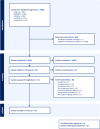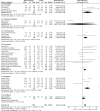Digital learning of clinical skills and its impact on medical students' academic performance: a systematic review
- PMID: 39696150
- PMCID: PMC11653901
- DOI: 10.1186/s12909-024-06471-2
Digital learning of clinical skills and its impact on medical students' academic performance: a systematic review
Abstract
Background: The constraints imposed by the COVID-19 pandemic has led to the rapid development and implementation of digital methods for teaching clinical skills in medical education. This systematic review presents both the benefits, challenges, and effectiveness of this transition.
Methods: A systematic search of six electronic databases (SCOPUS, Medline, CINAHL, PsycINFO, ERIC & Informit) was conducted on 1st October 2023 and updated on 1st April 2024 to identify peer- reviewed articles, from 2019 onwards, which used any type of digital tool (online or otherwise) to teach clinical skills to medical trainees (undergraduate or postgraduate) and were published in English language. The primary outcome synthesised was the reported effectiveness of these digital tools in the development of clinical skills. Risk of bias of included studies was assessed using the Quality Assessment With Diverse Studies (QuADS) tool.
Results: Twenty-seven studies involving 3,895 participants were eligible for inclusion in this review. The QuADS quality assessment scores ranged from 22 to 35, indicating medium quality and thirteen of the studies were randomized trials. Overall, digital teaching of clinical skills demonstrated improved or comparable outcomes to in-person teaching. There was a beneficial effect of digital learning tools on assessment outcomes, with meta-analysis showing a mean difference increase of 1.93 (95% CI 1.22 to 2.64), albeit with a high amount of statistical heterogeneity I2 97%, P < 0.001. Digital clinical skills teaching also resulted in improved student satisfaction scores in many situations and was also shown in one study to be cost effective.
Conclusion: Teaching of clinical skills using digital tools is an important alternative to the traditional format of face-to-face delivery, which is resource intensive and difficult to implement during a pandemic. This review demonstrates their potential efficacy in improving education outcomes, student satisfaction and potentially reducing costs. However, the integration of traditional and innovative digital teaching methods appeared to provide the most comprehensive learning experience. Future research could focus on longitudinal studies to assess the long-term impact and efficacy of different digital and blended learning modalities on the acquisition of clinical skills and professional competencies.
Keywords: Clinical skills; Digital learning; Medical education; Pedagogy.
© 2024. The Author(s).
Conflict of interest statement
Declarations. Ethics approval and consent to participate: Not applicable. Consent for publication: Not applicable. Competing interests: The authors declare no competing interests.
Figures
References
Publication types
MeSH terms
LinkOut - more resources
Full Text Sources
Medical
Miscellaneous





